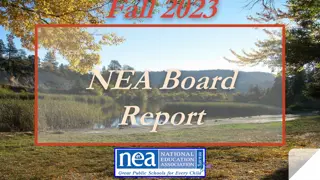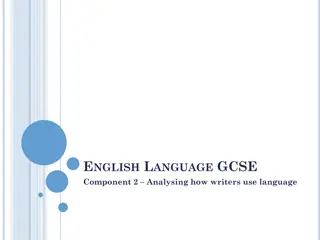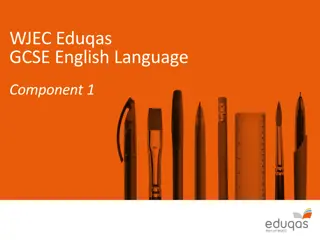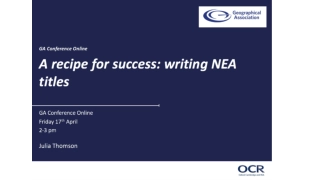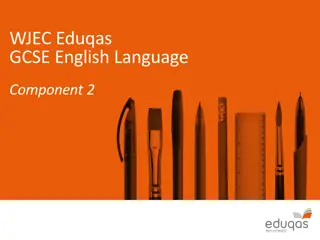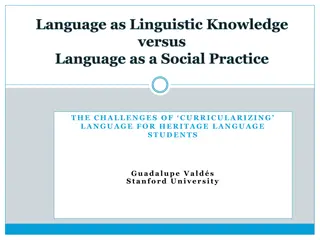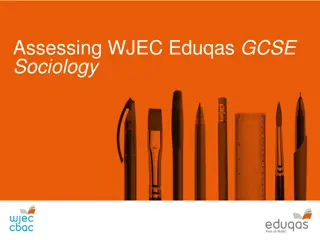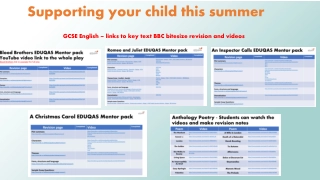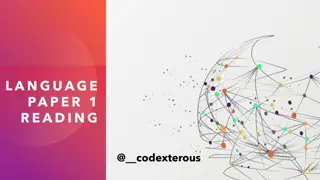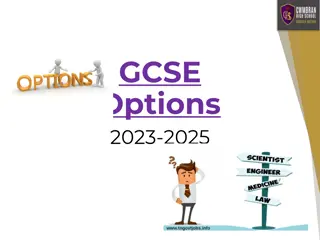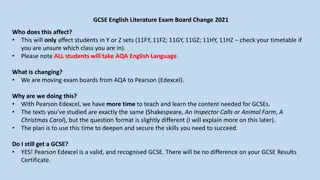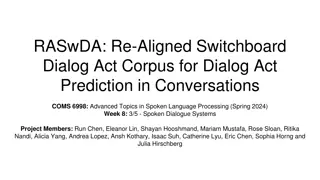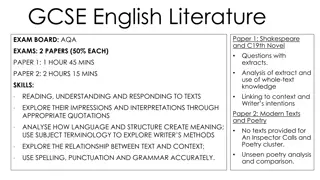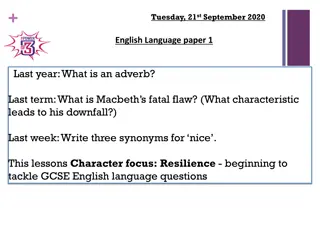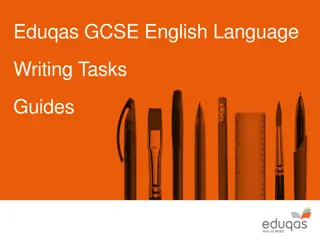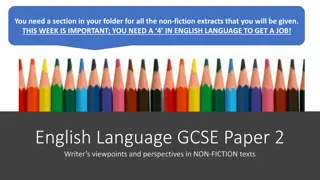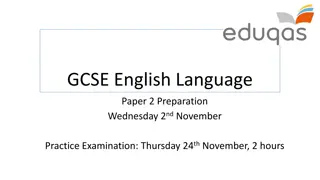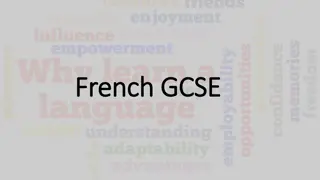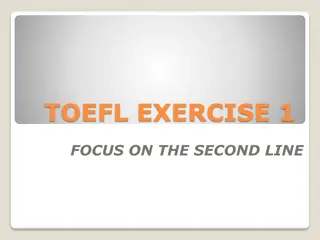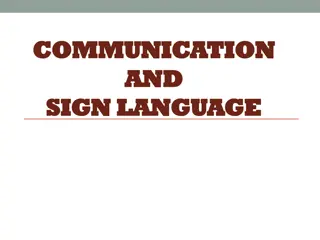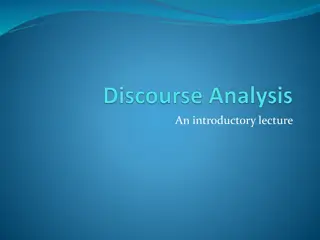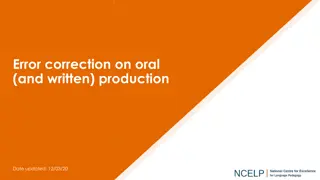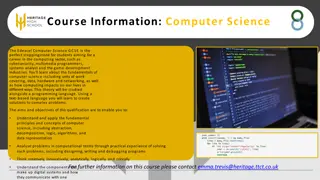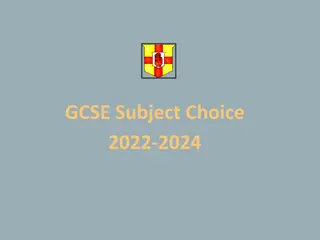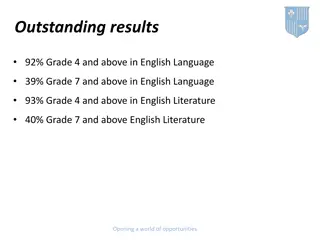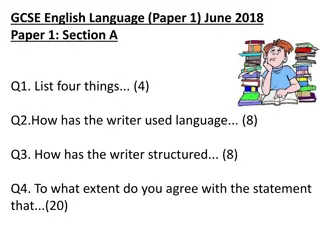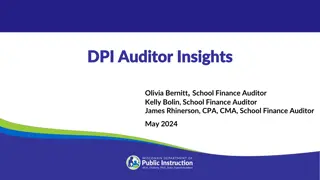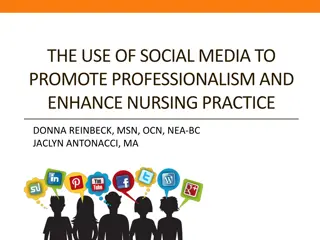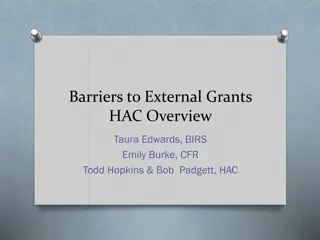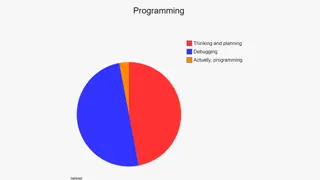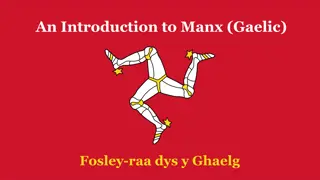Guidelines for GCSE Component 3 Spoken Language NEA
Key requirements for GCSE Component 3 Spoken Language NEA involve delivering an individual formal presentation on a self-selected topic. Successful presentations focus on engaging topics chosen by candidates, involve prior discussion with teachers, include advanced preparation, and meet audience needs. Less successful presentations typically arise from lack of interest in the topic, poor planning, inadequate challenge in content, and absence of a clear purpose. Both successful and less successful presentation features are outlined to guide candidates towards achieving better outcomes.
Download Presentation

Please find below an Image/Link to download the presentation.
The content on the website is provided AS IS for your information and personal use only. It may not be sold, licensed, or shared on other websites without obtaining consent from the author. Download presentation by click this link. If you encounter any issues during the download, it is possible that the publisher has removed the file from their server.
E N D
Presentation Transcript
GCSE Component 3 Spoken Language How to effectively manage Component 3 NEA
Spoken Language: Key Requirements To meet the specification requirements all candidates must give an individual presentation. The presentation must be formal but can take a variety of forms including talks, debates, speeches and dialogues. Candidates may select their own topics but should discuss their choices with their teachers who can offer guidance. Candidates should prepare their presentations in advance. They may use notes or visual aids, such as PowerPoint, to assist them during their presentations but this is not a requirement. As part of the presentation, candidates must listen to and respond appropriately to questions or feedback from an audience. Candidates work will be assessed by their teachers using a competency model rather than a best-fit approach.
Features of Successful Presentations In general, the most successful presentations: centre on a topic which genuinely interests the candidate rather than one imposed by the teacher involve some priorliaison or discussion between candidate and teacher benefit from advance preparation by the candidate include sufficient challenge in content, organisation and range of vocabulary to meet higher band criteria allow the candidate to meet the audience needs and achieve a clearly defined purpose, such as to persuade the listener(s) to support a point of view allow the candidate to demonstrate presentational skills such as making eye contact, using appropriate register and inflection, etc provide opportunity for the candidate to respond to some suitably challenging questions or feedback
Features of Less Successful Presentations In general, less successful presentations occur when: the candidate is not really interested in the chosen topic the topic has been imposed rather than selected by the candidate the topic was selected without teacher guidance or input the candidate has not planned or prepared adequately in advance the material is not sufficiently challenging or sophisticated to meet higher grade criteria there is no clearly defined purpose to help the candidate organise his or her ideas or meet the audience needs the candidate adopts a straightforward or descriptive approach to the material there is over-reliance on reading from notes or PowerPoint slides which affects engagement with the audience a paired or group task has not been organised to allow all candidates to meet the full assessment criteria
Choosing an appropriate topic There are no set topics or tasks for Component 3 but there is useful guidance to help candidates and teachers choose suitable topics on the Eduqas website, including: examples of successful topics or approaches which can be adapted to suit candidates interests and needs guidance on how to tweak candidates topic choices to meet higher grade criteria suggestions of how to differentiate tasks for different levels of confidence (see next slide for an example) advice on how to help candidates improve presentational skills to engage the audience examples of challenging questions to elicit more perceptive and developed responses
Task Setting Differentiation Example DISTINCTION: Sophistication Persuade a teenage audience to go cold turkey and give up gaming Defend or condemn computer games to a government select committee Persuade the local MP to support legislation to control sale and/or development of computer games Persuade the Senior Leadership Team of ways to incorporate computer games in the school curriculum. PASS: Straightforward The computer game I would recommend and why Candidate could specify particular target group: beginners small children OAPs peers Computer Games T MERIT: Challenge Persuade the audience of the drawbacks or dangers of computer games Persuade the audience of the benefits of computer games Advise parents on how to live with teenage addict Paired debate: for and against regulating or banning computer games Identify a specific audience necessitating change of register and level of formality Include a clearly defined purpose to persuade or engage the audience
Ideas for managing Component 3 NEA (1) Setting a time limit Candidates could be set a maximum time limit of 4 minutes for their presentations. Experience has shown that this has been sufficient time for well- prepared candidates to meet higher grade criteria* It can also be a useful way to motivate candidates to plan thoroughly, edit and organise their material effectively and practise their delivery in advance, all of which will boost their chances of success. * In the Interboard standardising exemplar materials, all three presentations awarded Distinction grade are under five minutes in length. Jibreel s presentation is just over three minutes long with a further two and a half minutes for his response to questions.
Ideas for managing Component 3 NEA (2) Limiting the number of questions As outlined in the PM s reports, it is the quality of the questions which counts, rather than the number asked. Rather than an open-ended question and feedback session, questions could be limited to a maximum of two or three, including at least one from the teacher. This would make the teacher responsible for asking at least one more challenging question but experience has shown it is often the teacher s feedback which plays a vital part in eliciting the perceptive responses needed to meet Distinction criteria.* Certain audience members, whether reliable fellow learners or teachers, could be tasked with the role of grand inquisitor with special responsibility for preparing a probing question while listening to the speaker s presentation! *In the Interboard standardising Distinction exemplars, the speakers respond to a limited number of questions with the teacher s more probing feedback inspiring the candidate s most perceptive response. In all three cases, the Q and A is shorter than 3 minutes.
Ideas for managing Component 3 NEA (3) Planning a Schedule of Presentations Rather than carrying out assessment of the presentations of an entire class in one chunk of lesson time at a particular point in the course, teachers could draw up a schedule of presentations from December to April. At the end of one or even two lessons each week, the final ten minutes could be used for a candidate to make their presentations and deal with feedback. This schedule would be as flexible as possible and candidates would be made fully aware of the date of their presentations well in advance so that they had ample time to prepare.
Ideas for managing Component 3 NEA (4) Dividing the class into smaller groups Rather than using whole-class time for Component 3, learners could be organised by the teacher into smaller groups of three to five, selected to work effectively together. Each member of the group in turn would deliver his or her presentation to the others who would act as the audience and provide feedback. All of the presentations would be assessed by a teacher who would also act as an additional member of the audience and ask a question to stretch more confident learners. Candidates who lack confidence in presenting their ideas to a larger audience might welcome a smaller, mutually supportive audience NB: While teachers often give up free time to assess activities such as these, it has been repeatedly pointed out in Eduqas guidance that this is far from ideal. In line with other GCSE subjects which require internal assessment, the centre s Leadership Team should ensure teachers are given adequate non-contact time to carry out this compulsory component of the specification.
Ideas for managing Component 3 NEA (5) Paired Debates Some centres have found this a useful way to integrate the NEA into classroom activities and also to provide less confident candidates with some support in giving their presentations. However, paired debates work best when they are carefully organised and candidates are fully aware of the formal nature of the task. Working together, two candidates can select a topic of appropriate challenge and complexity which allows each of them to present opposing views aiming to persuade each other and the audience/teacher to agree.* Each candidate would have a time limit to present his or her views, either promoting or opposing the motion . Each candidate could pose questions of his or her opponent and the teacher could also give feedback. If time allows, the debate could also involve a wider audience of three or four fellow students or even the whole class as the floor . The formal nature of the activity could inject a wider range of sophisticated vocabulary and help the speakers achieve the purpose of their talk by persuading the audience to support their side of the argument. *There are some examples of possible debating topics on the Eduqas website
Ideas for managing Component 3 NEA (6) Reinforcing Common Skills: Paper 2 Section B Writing Spoken Language presentations have clear links with Component 2 and could help reinforce or extend transactional writing skills including: o selecting relevant ideas and organising them effectively o using language and rhetorical techniques to present a convincing argument o appealing to a clearly defined audience o achieving a specific purpose o Using language to persuade o Adopting an appropriate register/degree of formality In past papers, candidates have been tasked with writing a talk/speech in Section B and this is one of the formats centres are advised to cover in preparing candidates for Component 2. Rather than viewing Component 3 as a separate add-on, teachers could combine preparation for the Spoken Language presentation with practice for Component 2 Section B.
Ideas for managing Component 3 NEA (6) Reinforcing Common Skills: Paper 2 Section B Writing (continued) Sample Task 1 Candidates might be asked to write a report for senior leadership on ways to tackle bullying in the school/college in Section B. This could first be adapted as a Spoken Language task in which candidates select, organise and present their views to their peers. It could also be a useful way to highlight differences in format, tone and register between a persuasive speech and a formal report. Sample Task 2 Candidates might be asked to write a lively article about a local issue. This could form the basis of a paired debate in which two candidates, argue for or against the proposal, followed by questions from the floor and even a class vote to decide. Once again, exploring similarities and differences between a presentation and an article could help consolidate the distinct formats.
Ideas for managing Component 3 NEA (7) Reinforcing Common Skills: Links with English Literature As with Component 2 Writing, teachers could combine preparation for the Spoken Language presentation with coverage of the English literature course. However, past experience has shown clearly that this approach works best when the task is carefully organised and candidates are given some choice. Imposing a common task can be counter-productive, leading to dry, descriptive presentations and dampening enthusiasm for the set text involved. Less successful approaches, such as describing a character or a theme from a set text, tends to restrict candidates to a Pass grade.
Ideas for managing Component 3 NEA (7) Reinforcing Common Skills: Links with English Literature (Continued) English literature paper questions are often worded to allow candidates to select relevant details or evidence from the text to make a convincing case These skills are also integral to a successful Spoken Language presentation: eg Even though Mercutio dies at the beginning of Act 3, he is very important to the play as a whole. Show how Mercutio could be described as important to the play as a whole. This could be converted to a Spoken Language task. The speaker has to give a presentation persuading the audience of Mercutio s importance. An opposing speaker could argue that Tybalt, Benvolio or Friar Lawrence are more central to the play s themes. The task could easily be adapted to any character in a set text.
Ideas for managing Component 3 NEA (7) Reinforcing Common Skills: Links with English Literature (Continued) Candidates aiming at Merit or Distinction can be encouraged to inject more challenge by promoting a view or making a well- supported case. Put the character on trial! Candidates could prosecute or defend controversial characters such as: Shylock; Lady Macbeth; Gerald Croft; Mrs Winterson; George Wickham; Ebenezer Scrooge, etc Put the writer on trial! Confident candidates could tackle the problem of: o racism in Othello, The Merchant of Venice or Anita and Me, o sexism in Jane Eyre, Pride and Prejudice or An Inspector Calls o social issues in Oranges Are Not The Only Fruit, Blood Brothers or The History Boys, etc
Ideas for managing Component 3 NEA (7) Reinforcing Common Skills: Links with English Literature (Continued) Teach the text! Candidates aiming at higher grades could teach an aspect of a set poem or explain why a character or event is so crucial to the text s success. Promote the text! Candidates could promote a text to a specific audience, such as a literary prize panel, or even persuade Year 9 students to choose (or reject!) English literature as an option. Pitch the text! Candidates could persuade BBC or Netflix executives to produce the text as a series or film.* *In the Interboard standardising examples Pheobe promotes her set novel to a radio audience of teenagers as a good read .
Streamlining Assessment Rather than applying a best-fit approach, teachers must assess candidates presentations using a competency model in which all the criteria of a grade must be met before the grade can be awarded. e.g. to gain a Distinction, in addition to speaking audibly and with an appropriate level of formality, a candidate must meet all the following criteria: express sophisticated ideas/information/feelings using a sophisticated repertoire of vocabulary organise and structure the presentation using an effective range of strategies to engage the audience, achieve the purpose of the presentation listen to questions/feedback, respond perceptively and if appropriate elaborate with further ideas and information
Streamlining Assessment There is no requirement to retain detailed notes but centres are encouraged to keep a formal record of each presentation using the straightforward proforma. Centres do not have to submit record-keeping documents for monitoring The Inter-board standardising exemplars* will remain the same, making it straightforward for teachers to refamiliarise themselves with agreed standards by watching an appropriate sample of the twelve exemplar presentations covering Pass, Merit and Distinction. *The standardising exemplars are available for teachers to access on the Secure Website
Resources for Teachers Supporting teaching and learning Existing support materials for centres available on the Eduqas websites include: GCSE English Language Specification Additional support materials including FAQs Guidance on task setting and presentation skills Assessment guidance Assessment proformas: teaching group and individual Inter-board standardising exemplars with written commentaries (on the secure website) Advice for teachers of students with special communication needs NEA Principal Moderator s reports
Any Questions? Contact our specialist Subject Officers and administrative support team for your subject with any queries. gcseenglish@eduqas.co.uk 029 2240 4288 @Eduqas_English eduqas.co.uk


